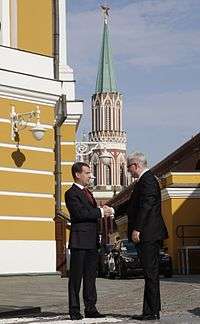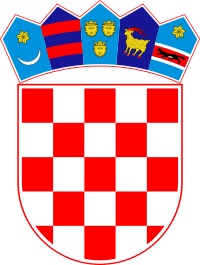Croatia–Russia relations
 |
|
Croatia |
Russia |
|---|---|
Croatia–Russia relations (Russian: Российско-хорватские отношения, Croatian: Rusko-hrvatski odnosi) refer to bilateral foreign relations between Croatia and Russia. Both countries established diplomatic relations on May 25, 1992. Croatia has an embassy in Moscow and an honorary consulate in Kaliningrad. Russia has an embassy in Zagreb.
Though geographically not very close, Croatia and Russia are both Slavic countries and thus share certain cultural and linguistic similarities. Both countries are full members of the Council of Europe and the Organization for Security and Co-operation in Europe.
Russian tourists regularly visit Croatia on summer holidays, while Croatian tourists often visit Russia on city trips. In addition, many Russians have purchased real estate along Croatia's Adriatic coast.
History


Cultural ties between Russia and Croatia date back far in history. With the development of inter-state communication the number and areas of the Russian-Croatian communication expanded. During the reign of the Russian Emperor Peter the Great (1682-1725) Russian aristocrat Pyotr Andreyevich Tolstoy visited Zadar and Dubrovnik to study seamanship.[1] Croatian Dominican priest Benjamin was the editor of the first translation of the Bible into old-Slavic (Russian) language in 1499. Croatian Catholic missionary Juraj Križanić wanted Russia to reorganize into, in terms of enlightened absolutism, organized and powerful state which would become a counterbalance to Germany which was considered to be the main and most dangerous enemy of all Slavs. Croatian violinist Ivan Mane Jarnović has been the first violinist in the orchestra of the Russian Empress Catherine the Great for three years.
Russian philosopher and poet Vladimir Solovyov was very close to the Croatian intellectuals Josip Juraj Strossmayer and Franjo Rački. He spent two months in Croatian capital Zagreb where his book was published in Dionička tiskara. Solovyov loved all Slavs, particularly Poles and Croats. He had a desire to unite all Slavs into one Catholic Church, because some Slavs are Roman, while others are Orthodox Catholics. Soloviev well known cultural and political situation of the Croats. He translated into Russian several verses of song Moja lađa (My boat) written by Petar Preradović.[2]
Lot of famous Croats traveled to Russia and later published their memories in many itineraries. Among them are: Vatroslav Jagić-"Spomeni mojega života [u Rusiji]" (Memories of my life [in Russia]), Alberto Ognjen Štriga-"Moj put u Rusiju" (My trip to Russia), Stjepan Radić-"Moj put u slavenski svijet" (My trip to the Slavic world), Franjo Rački-"Putne uspomene" (Travel memories), Milan Šenoa, August Cesarec and Miroslav Krleža.
Prominent Croatian scholar of Slavic studies Vatroslav Jagić corresponded with 37 Russian and Ukrainian scientists, academics and social workers. These letters are kept in the archives of the Russian Academy of Sciences. He left such a strong impact on Russians that they consider him to be their linguist. He was signing himself as Ignatius Vikentijević Jagić (Russian- Игнатий Викентьевич Ягич).
The first monument in the world made in honor of famous Russian novelist Leo Tolstoy was created in masters workshop in Selca in 1911.[3]
The richest and most important collection of Croatian Glagolitic documents and books outside Croatia is located in Saint Petersburg. It is a famous Berčićević collection which contains 5 Glagolitic codexes, 154 fragments (total of 386 saved pages) written between the 13th and 16th century, as well as 53 cursive Glagolitic text derived from the 15th-18th century.[4]
In June 1896, Croatian diva Milka Trnina performed at a concert in Moscow before the Russian royal family on the occasion of the coronation of Tsar Nicholas II. Empress Alexandra asked Trnina to sing her an aria from Wagner's opera Tristan and Isolde. Russian Emperor rewarded Trnina for her excellent performance with a large diamond brooch decorated with rubies which is today kept in the Museum of Arts and Crafts in Zagreb. Empress gave Trnina bracelet made out of brilliants.[5]
Russians in Croatia

Russians that live in Croatia are one of 22 recognized national minorities. According to 2011 Census, there are 1279 Russians in Croatia. Russians started to come into Croatia in 1915 mostly as prisoners from the First World War. Some of them after a short time died, others returned to Soviet Russia, while the rest of them decided to stay in Zagreb or elsewhere on the Croatian territory. These Russians stand out among them: mathematician Boris Apsen,[6] doctor Sergei Saltykov[7] (member of the Croatian Academy of Sciences and Arts) and chemist and pharmacist Ivan Plotnikov.[8] In the post-IIWW SFR Yugoslavia during the 1960s and 1970s many economic ties were established with the Soviet Union which encouraged immigration of Russians to Croatia. Representatives of the Croatian companies have been working in Russia for a long time and eventually returned to Croatia with Russian wives.[9]
First Russian Orthodox Church was built in Crikvenica in 1924 at the initiative of the Russians who fled to Crikvenica after the October Revolution. It is dedicated to Saint Nicholas who is, among others, patron saint of Russia.[10] There is also a Russian chapel on the Mirogoj cemetery.[11]
Members of the Russian Red Army were fighting on the Croatian territory during the Second World War algo side Tito's Yugoslav Partisans. They experienced many victories and few defeats. At Battle of Batina in 1944, 1,297 members of the Red Army were killed by the Nazies.[12]
Croat Aleksa Dundić was a participant of the Russian October Revolution. He is the only Croat awarded with the Order of the Red Banner.
Political ties
Many famous Croats sought to develop strong relationship with Russia because "they saw in Imperial Russia a world power and brotherly Slavic nation from which they had hoped to gain help during the Croatian National Revival."[13]
Eugen Kvaternik traveled to Russia with a lot of hope that he will get help with the Croatian independence from the Austrian empire. He resided in St. Petersburg from 1858 but didn't achieve much. He made a contact with senior Russian officials and was a Russian secret agent during 1859 and 1860. He was acting "against Austria and in favor of Croatia and Russia". He even received Russian citizenship but later dropped out from citizenship and asking for Russian help because he didn't receive a satisfactory cooperation from it.[14]
Ivan Kukuljević Sakcinski was very fond of Russians. He came in contact with a large number of Russian academics, slavists, university professors with whom he corresponded for many years. His connection to them was the Russian priest who worked in the Russian Embassy in Vienna, Mihail Fjodorović Rajevski. He wrote to Alexander Stepanovich Popov in 1877: "You in Moscow know very well for how long South Slavs had been waiting for salvation. You also know that the eyes of the Slavs are fixed on you and that our hearts are fully with you".[15] Sakcinski received many honors from Russia.
Josip Juraj Strossmayer has laid great hopes on Russia to help other Slavic peoples and to unite Catholics and Orthodox Christians. He corresponded with a large number of prominent Russians for many years, including the Russian ministers, princes, Consul Generals, theologians, metropolitans, counts and many others. He also endeared with the Russian philosopher Vladimir Solovyov who also visited Croatia for two months. Strossmayer also developed a very close correspondence with Elizabeth Trubeck who was a princess maid of honor of the Russian empress. They exchanged many letters about political issues.
Stjepan Radić corresponded with many distinguished Russians. He was in St. Petersburg and Moscow many times and even joined his Croatian Peasant Party with the communist Peasant International.
During the Croatian War of Independence
During the UN arms embargo applied on Yugoslavia during the Croatian War of Independence, Croatian entrepreneur Zvonko Zubak imported large amounts of weapons from Russia. In addition, Russian President Boris Yeltsin approved shipment of 150 airplanes full of Russian weaponry to Croatia which were regularly taking off from the military base 200 kilometers east of Moscow in the period from 1992 to 1997. There were 150 to 160 flights that transported hundreds of tons of weaponry per year.[16][17]
Russian journalist and correspondent of the Russian state television in Belgrade Viktor Nogin and Gennady Kurinoj were killed by members of the Serbian paramilitary forces on September 1, 1991 on road Hrvatska Kostajnica-Petrinja near Panjani.[18]
Many soldiers that were deployed in Croatia as members of United Nations Protection Forces were from the Russian army. There were also some Russian mercenaries that were fighting against Croatia in Eastern Slavonia and Lika.
Economic exchanges
At the annual level exchange of goods between two states is about $1.8 billion. Russia is the fifth most important Croatian economic partner.[19] In 2012, Croatian exports to Russia totaled $312 million. Croatia exports mainly drugs, shaving products, flasks for metal foundry, electrical transformers and generating sets, while Russia exports oil, oil and petroleum gases, accounting 90 percent of imports from Russia to Croatia, mineral and chemical fertilizers, aluminum wrought and boilers for steam production.[20]
In year 2012, more than 203.000 Russian citizens visited Croatia.[21] After Croatia joined the EU in 2013, it was forced to introduce visas for Russian, Ukrainian and Turkish nationals, which consequentially led to the decline in arrivals of Russian tourists by third in 2015.
See also
References
- ↑ "Veleposlanstvo Rusije u Hrvatskoj". Zagreb.mid.ru. Retrieved 2016-05-01.
- ↑ Jean Rupp, Message eccléisal de Solowiew, Lethielleux, Paris, Vie avec Dieu, Bruxelles 1974, str. 71
- ↑ Zubrinic, Darko (1995). "Croatian Art". croatianhistory.net. Retrieved 14 December 2015.
- ↑ "Hrvatska glagoljica u Rusiji". Croatianhistory.net. Retrieved 2016-05-01.
- ↑ Piše: Hina srijeda, 18.12.2013. 18:23 (2013-12-18). "Izložba o Milki Trnini otvorena u Muzeju grada Zagreba - Vijesti". Index.hr. Retrieved 2016-05-01.
- ↑ "Nastavnici matematike na ZPM". Zpm.fer.hr. Retrieved 2016-05-01.
- ↑ "Archived copy". Archived from the original on 2014-08-17. Retrieved 2015-07-24.
- ↑ "Plotnikov - značenje". Hrleksikon.info. Retrieved 2016-05-01.
- ↑ "Archived copy". Archived from the original on 2014-04-03. Retrieved 2015-07-24.
- ↑ "Kulturno-povijesna baština | crikvenica". Rivieracrikvenica.com. Retrieved 2016-05-01.
- ↑ "This website is for sale! - destinacije Resources and Information". Destinacije.com. Retrieved 2016-05-01.
- ↑ "Archived copy". Archived from the original on July 24, 2015. Retrieved July 24, 2015.
- ↑ Otokar Keršovani, History of Croatia
- ↑ Eugen Kvaternik: Gorke uspomene "Hervatska", 1870.
- ↑ "Grada Za Povijest Hrvatsko-Ruskih Veza U Drugoj Polovini Xix Stoljeca\website=Historiografija.hr" (PDF). Retrieved 2016-11-07.
- ↑ "Hrvatsku naoružali Rusi: Jeljcin odobrio 150 letova transportera - Večernji.hr". Vecernji.hr. 2013-06-15. Retrieved 2016-05-01.
- ↑ "Rusi naoružali Hrvatsku". Glassrpske.com. 2013-06-16. Retrieved 2016-05-01.
- ↑ Mate Piškor (2011-05-02). "RATNI ZLOČIN: Rusi i Srbi skrivaju istinu: Ubijeni novinari u Beogradu dobiti će spomenik". Jutarnji.hr. Retrieved 2016-05-01.
- ↑ "Suradnja s Rusijom strateški je interes hrvatskog gospodarstva « Hrvatska gospodarska komora". Hgk.hr. Retrieved 2016-05-01.
- ↑ "Iznimno veliko zanimanje hrvatskih tvrtki za suradnju s ruskim kompanijama « Hrvatska gospodarska komora". Hgk.hr. 2012-06-15. Retrieved 2016-05-01.
- ↑ "Zbog viza broj ruskih turista pada za četvrtinu". tportal.hr. 2013-01-29. Retrieved 2016-05-01.
External links
| Wikimedia Commons has media related to Croatia–Russia relations. |
- Documents on the Croatia–Russia relationship from the Russian Ministry of Foreign Affairs (Russian)
- List of international treaties and international acts signed between the Republic of Croatia and the Russian Federation
- Embassy of Russia in Zagreb (Croatian) (Russian)
- Embassy of Croatia in Moscow (Croatian) (Russian)
- Croatian Russian historical and cultural relations

